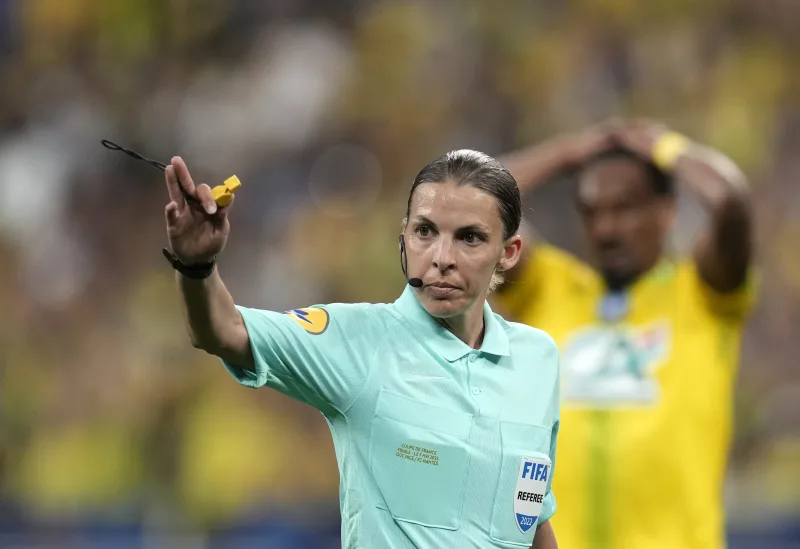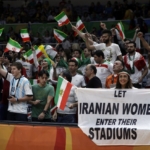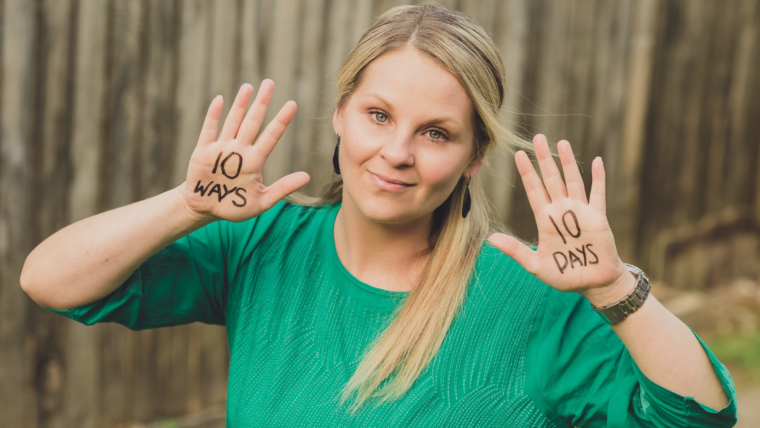
FIFA Picks First Female Referees for Men’s World Cup
It is the first time that women, three referees and three assistant referees, were selected to officiate games at the top men’s soccer tournament, which will be held in Qatar this year.
By Tariq Panja

The Qatar World Cup was always going to be full of firsts: the first time it will be played in the Middle East; the first time it will be played in November and December. Now, it may also be the first men’s World Cup tournament in which a game is refereed by a woman.
FIFA on Thursday named three women among the 36 referees chosen to officiate at the event and three more in the group of assistants that will run the line at the monthlong tournament. The most likely candidate among the three to get a starring role is Stéphanie Frappart of France, who has broken a number of barriers in European soccer.
Frappart, who made the list alongside female referees from Rwanda and Japan, has a stellar reputation in European soccer as the first woman to referee men in the Champions League, France’s top division and World Cup qualification games. This month, she refereed the final of the men’s French Cup.
Frappart was also chosen to join the officiating teams at last summer’s European Championship, but her role was limited to that of fourth official, a function on the sideline between the benches of the opposing teams.
In announcing its refereeing choices, FIFA may now look to go one step further. Joining Frappart in the refereeing group are Salima Mukansanga from Rwanda and Yoshimi Yamashita from Japan. They and the other World Cup-bound officials will attend seminars in preparation for the 32-team event.

“This concludes a long process that began several years ago with the deployment of female referees at FIFA men’s junior and senior tournaments,” said Pierluigi Collina, the chairman of the FIFA referees committee. “In this way, we clearly emphasize that it is quality that counts for us and not gender.”
North American women have also been selected to participate in the tournament as assistant referees. Kathryn Nesbitt, a regular in Major League Soccer, is joined by Karen Díaz Medina of Mexico. Neuza Back from Brazil is also included.
For FIFA, the push to include more women on and off the field has become increasingly urgent amid greater scrutiny of how it manages the sport and a growing global interest in women’s soccer. More money than ever has been invested in developing players and match officials. That, Collina said, should help make the sight, and inclusion, of female referees less of a talking point than it remains today.
“I would hope that in the future, the selection of elite women’s match officials for important men’s competitions will be perceived as something normal and no longer as sensational,” he said. “They deserve to be at the FIFA World Cup because they constantly perform at a really high level, and that’s the important factor for us.”
Still, the environment and focus on female officials can be exacting. Frappart faced abusive messages on social media before and after she officiated the French Cup game, which was decided after a penalty call.
Frappart said before that game that she stayed away from social media and rarely read the press. “Personally, I am focused on what happens on the pitch and don’t pay attention to controversies or discussions about my performances,” she said.
That the opportunity for the first female officials to take part in a World Cup is taking place in a conservative Gulf state like Qatar adds to the intrigue. Some establishments and restaurants in the tiny emirate are separated, with groups of men not allowed to enter areas designated for women or families. Stadiums, though, will be open, without such restrictions.

FIFA has become increasingly innovative when it comes to officiating its multibillion-dollar tournament. The last two editions of the tournament featured goal line technology. At the last one, in Russia, FIFA introduced video assistant refereeing, largely without affecting the flow of the game.
VAR was also used at the last Women’s World Cup, in France, in 2019, but its use, largely because of running costs, is not yet universal in the sport. For that reason, FIFA said the teams at the controls are mainly drawn from Europe and South America.
Choosing referees for the tournament was made harder by the pandemic, and that is also, in part, why FIFA made its announcements earlier than usual. “We want to work even harder with all those who have been appointed for the FIFA World Cup, monitoring them in the next months,” said Collina, a former World Cup final referee. “The message is clear: Don’t rest on your laurels, keep working hard, and prepare yourselves very seriously for the World Cup.”
FIFA is also keen to ensure its officials are able to keep up with players who are fitter than ever. For that, the organization said it would provide each official with a plan to follow to arrive in Qatar in peak form. “Each match official will be carefully monitored in the next months with a final assessment on technical, physical and medical aspects to be made shortly before the World Cup,” Massimo Busacca, FIFA’s director of refereeing, said.
But for all the work, all the focus, a referee’s fate could be defined by one bad call.
“We can’t eliminate all mistakes, but we will do everything we can to reduce them,” Busacca said.
Featured Image by AP Photo/Christophe Ena






